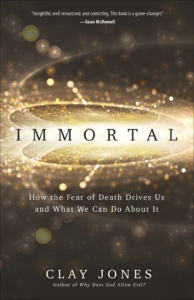“How can I enjoy heaven knowing my loved ones are in hell?” Indeed, I’m often asked this question and the above meme was posted in a Facebook Christian apologetics group and as of this writing has 564 comments.
To answer this question there are important things to consider. Many Christians today think that the reason that their loved ones aren’t saved is the result of a simple mistake—that God hasn’t provided the evidence necessary for them to come to Him. These people often suggest that when these people actually see the God of love then they would then realize that they were wrong and want to be with Him. But that would be the case only if the rejection of God was a matter of a simple misunderstanding, akin to ordering the wrong dessert: “I chose the chocolate ice cream when I should have chosen the strawberry, and now I’m lost forever. I didn’t know!” But the Bible continuously reveals that those who are lost are not lost because of a lack of information or evidence but because of a hardness of heart.
I could quote many passages on this but I’ll only quote two. Romans 1:18-20 tells us that “For the wrath of God is revealed from heaven against all ungodliness and unrighteousness of men, who by their unrighteousness suppress the truth. For what can be known about God is plain to them, because God has shown it to them. For his invisible attributes, namely, his eternal power and divine nature, have been clearly perceived, ever since the creation of the world, in the things that have been made. So they are without excuse.” This passage tells us that those who don’t believe there is a God do so out of the hardness of their heart.
Then, in Matthew 12:22 we read about Jesus that “a demon-oppressed man who was blind and mute was brought to him, and he healed him, so that the man spoke and saw.” An unmistakable miracle had been done but out of the hardness of their hearts the Pharisees needed something—anything really—so in v. 24 they proclaimed that Jesus obvious miracle was done by the power of Satan. Jesus responded and that they had committed the blasphemy of the Holy Spirit (v.32) which “will not be forgiven, either in this age or in the age to come.” I’ve written an article about “The Unpardonable Sin,” for the Christian Research Journal.[1] Undeterred, some of the scribes and Pharisees asked for still another sign (v.38). But in v. 39-40 Jesus answered them, “An evil and adulterous generation seeks for a sign, but no sign will be given to it except the sign of the prophet Jonah. For just as Jonah was three days and three nights in the belly of the great fish, so will the Son of Man be three days and three nights in the heart of the earth.” Notice that Jesus said that those who say they need more evidence are “evil and adulterous” and that He’s not giving another sign except for the sign of His resurrection.
Then Jesus gives two more examples of how little evidence is needed for the tender-hearted to repent in v. 41: “The men of Nineveh will rise up at the judgment with this generation and condemn it, for they repented at the preaching of Jonah, and behold, something greater than Jonah is here.” So some foreigner walks through Nineveh telling them of coming judgement and they repent without needing more “signs”! Then in v.42 Jesus gives another example, “The queen of the South will rise up at the judgment with this generation and condemn it, for she came from the ends of the earth to hear the wisdom of Solomon, and behold, something greater than Solomon is here.” The queen of the South heard only rumors that she should find this wise man named Solomon so she packed up the camels and traveled hundreds of miles to hear him. Jesus is pointing out that the tender of heart don’t need much to lead them to repentance. Thus we have no reason to think our loved ones conscious rejection of Jesus here will diminish at the judgment. Rather, there is a sense that in Hell they will obtain what they most desire: separation from God.
The Judgment will reveal that those who reject Jesus have rebellion locked deeply into their hearts. In fact, at the Judgment, when all humans are revealed for who they really are, we’ll witness a similar self-seeking attitude. Zygmunt Bauman, in his book Modernity and the Holocaust, gives us insight as to how, under pressure, otherwise nice people are not anyone we would want to be around:
A few years ago a journalist of Le Monde interviewed a sample of former hijack victims. One of the most interesting things he found was an abnormally high incidence of divorce among couples who went jointly through the agony of hostage experience. Intrigued, he probed the divorcees for the reason for their decision. Most of the interviewees told him that they had never contemplated a divorce before the hijack. During the horrifying episode, however, “their eyes opened,” and “they saw their partners in a new light.” Ordinary good husbands “proved to be” selfish creatures, caring only for their own stomachs; daring businessmen displayed disgusting cowardice; resourceful “men of this world” fell to pieces and did little except bewailing their imminent perdition.[2]
Those who understand the depths of human evil will not be surprised by this.[3] When the veneer of civilization is stripped away at the Judgment and people are revealed for who they really are, then we will see that all human rebels will reject God.
This answers another objection about hell: Could any enjoy heaven knowing that their loved ones are there? But when our loved ones’ rejection of God is plain and their true attitude toward others is revealed, no Christian will wish they could spend eternity with such a person—just as spouses who experienced the hijacking together realized that they couldn’t go on being married to such a sniveling coward. Hell will seem oddly fitting.
So, yes, we will enjoy heaven even if our loved ones are in hell. That doesn’t mean that their being in hell isn’t a tragedy. It is! But it will be a tragedy for them, not for us. In fact, once we see who they really are, we will realize that we will be happier in heaven without them.
One last thought, in Jesus considered opinion our “real relatives” are those who are presently faithful disciples of Jesus. In Matthew 12:46-50 we are told, “While he was still speaking to the people, behold, his mother and his brothers stood outside, asking to speak to him. But he replied to the man who told him, ‘Who is my mother, and who are my brothers?’ And stretching out his hand toward his disciples, he said, ‘Here are my mother and my brothers! For whoever does the will of my Father in heaven is my brother and sister and mother.’”
[1] Clay Jones, “What Is the Unpardonable Sin?,” Christian Research Journal, June 21, 2013, https://www.equip.org/articles/what-is-the-unpardonable-sin-2a/.
[2] Zygmunt Bauman, Modernity and the Holocaust (Ithaca, NY: Cornell, 1989), 6.
[3] I write at length about the depts of human evil in Clay Jones, Why Does God Allow Evil?: Compelling Answers for Life’s Toughest Questions (Eugene, OR: Harvest House, 2017. Most of the second-half of this post was adapted from that book. The link is below.


Immortal: How the Fear of Death Drives Us and What We Can Do About It

